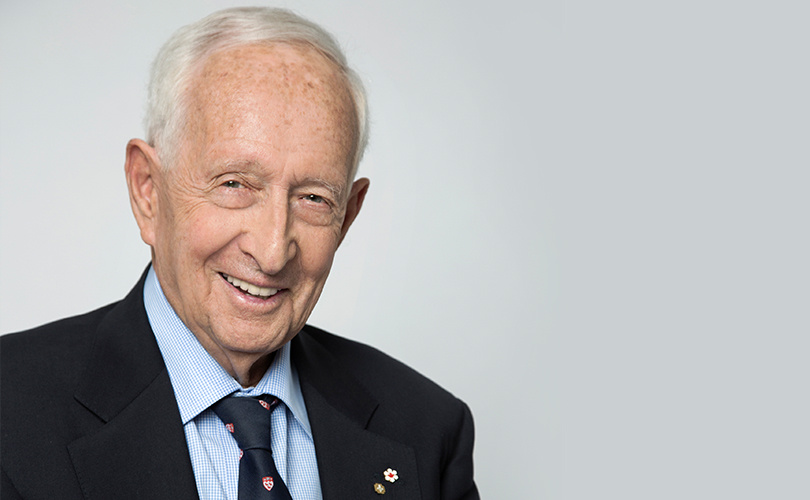
At one intersection of technology and philosophy stands that old chestnut: the trolley problem.
Originally introduced as a theoretical dilemma some 40 years ago, the trolley problem describes a runaway trolley car speeding along the tracks and headed towards five innocent bystanders. As an observer, you are conveniently located next to a lever which would enable you to divert the trolley onto a different track where only one person is a risk. So what do you do?
When introduced, this problem was simply a hypothetical thought experiment to illustrate an ethical dilemma. But today we live in a world of self-driving cars, and suddenly the trolley problem has become a real problem.
“If we have self-driving cars, that ‘trolley’ decision has to be made because one day that car might encounter exactly that situation,” says Ian Gold, BA’84, MA’87, Professor of Philosophy and Psychiatry at McGill. “Who gets to make that decision? Is it made in the factory by General Motors, or is it made by the person who owns the car or someone else? That’s not a philosopher’s fantasy question, that’s a real question that has to be addressed right now.”
The trolley problem is just one illustration of the important philosophical questions raised by the rapid development of technology and artificial intelligence. Other examples abound from racial biases in facial recognition software, algorithms to identify hate speech on social media platforms and issues of privacy and data protection for users of technology.
Pressing philosophical problems
“I derive many benefits by being able to Google something,” says Gold. “But what am I prepared to put up with to get those benefits? That’s a decision we have to make as a society. The problem is that right now there isn’t enough community discussion about the central issues.”
Thanks to a $2-million gift from the Jarislowsky Foundation, McGill will establish a Chair in McGill’s Department of Philosophy to undertake ground-breaking research and scholarship addressing these kinds of pressing philosophical questions. The timely donation will be matched by funds from McGill in order to endow the Chair’s total cost of $4 million.
The new Chair, to be named the Stephen Jarislowsky Chair in Technology and Human Nature, will bring together a deep understanding of new technology along with a strong philosophical perspective on the many social, ethical and political issues inherent in the development of AI and other technologies, It will also examine the impact of technology on individuals – young and old alike – and how it influences development at every stage of their lives.
Lin Centre links
While the Chair will be based in the Department of Philosophy, it will promote collaboration with researchers and students from across the University, as well as with the wider Montreal technology community. In particular, the Chair will work closely with the Yan P. Lin Centre for Freedom and Global Orders in the Ancient and Modern Worlds, which has established itself as a locus for studying social structures, social transformations, and ideas about social values from across eras and in regions around the world.
“The Lin Centre is looking forward to working with the Chair and providing the institutional infrastructure and apparatus that will allow collaboration across departments and faculties,” says Jacob Levy, Director of the Lin Centre and Tomlinson Professor of Political Theory. “We would like to see McGill become a place where scholars who want real training on the technological side of things and on the philosophical or other liberal arts side of things could get those together.”
The objective of the Chair is not to vilify technology. Technological advances are not intrinsically good or bad, but the use of technology can certainly exert a positive or negative impact on our lives. Gold maintains that the only way to get what we truly want from technology is to examine it carefully through a philosophical lens – the core challenge for the new Chair.
“It’s not a job that a technology person can do because they haven’t necessarily considered the philosophical or ethical or social implications,” explains Gold, who is a member of the Chair search committee. “By the same token, an ethicist or political scientist or sociologist can’t really tackle the job unless they understand how the technology works.”
Support for teaching and research
“There is an urgent need for all of us to consider the implications of technology for individuals and society,” says Jarislowsky Foundation founder Stephen Jarislowsky, LLD’08, one of Canada’s foremost philanthropists and business leaders. His eponymous Foundation has endowed research and academia in fields ranging from governance, democracy and public sector management to arts and medicine, including the Stephen Jarislowsky Chair in Urology at McGill’s Faculty of Medicine and Health Sciences. “I am pleased to have this opportunity to support McGill’s work in making a major contribution to teaching and research in this field.”
Key objectives of the Chair will be to mentor students, work with the thriving computer technology industry in Montreal, and also engage the community through public events and outreach initiatives, articulating key issues and questions about the impact of technology.
“This generous gift from the Jarislowsky Foundation puts McGill in the exciting position to recruit a world-class scholar to interrogate the relationship between technology and human nature,” says Hasana Sharp, Associate Professor and Chair of McGill’s Department of Philosophy. “This is an example of how our University is actively addressing some of the most timely and important questions facing us as individuals, as a community and as a society.”

Informative